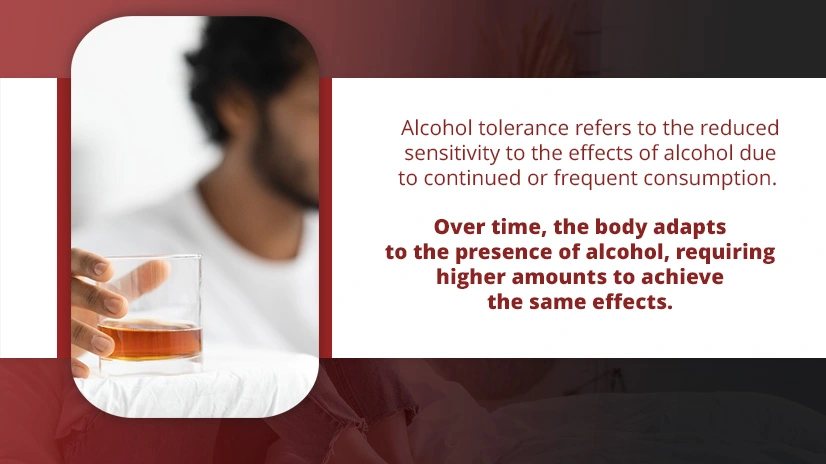
A Guide On Alcohol Tolerance
Clinically Reviewed by:
Alcohol tolerance is a topic that many people are curious about, whether they’re occasional social drinkers or regular alcohol consumers. Understanding alcohol tolerance involves delving into how our bodies process alcohol, how tolerance levels can vary from person to person, and the potential risks associated with developing a high tolerance.
In this article, we’ll explore what alcohol tolerance means, the factors that influence it, and why it’s essential to be mindful of your alcohol consumption habits.
Key Takeaways
Alcohol tolerance refers to the body’s ability to withstand the effects of alcohol due to continued exposure. Here’s what you need to know:
- Alcohol tolerance can develop over time, leading to the need to drink more to feel the same effects.
- Factors such as genetics, body weight, and drinking habits can influence alcohol tolerance.
- Increased alcohol tolerance can be a sign of alcohol dependence and may indicate the need for professional help.
Contact Indiana Center for Recovery at (855) 563-0391 for more information and recovery assistance to live a brighter tomorrow ahead.

Definition Of Alcohol Tolerance
Alcohol tolerance refers to the reduced sensitivity to the effects of alcohol due to continued or frequent consumption. Over time, the body adapts to the presence of alcohol, requiring higher amounts to achieve the same effects.
This can lead to increased alcohol consumption, which poses health risks and can contribute to the development of alcohol dependence.
Various factors, including genetics, age, gender, body weight, and drinking patterns influence tolerance. Developing tolerance to alcohol can be a sign of problematic drinking behavior and may indicate the need to reassess alcohol consumption habits.
Science Behind Alcohol Tolerance
Alcohol tolerance is the body’s adaptation to the effects of alcohol over time, leading to the need for increased quantities to achieve the same effects. Several factors contribute to alcohol tolerance, including genetics, age, gender, and drinking habits.
How Alcohol Impacts The System
Alcohol affects the central nervous system, leading to changes in mood, behavior, and cognitive function. It depresses the central nervous system, slowing brain activity and impairing judgment and coordination. Alcohol also affects the liver, where it is metabolized, and can cause damage if consumed excessively.
Biological Mechanisms Of Alcohol Tolerance
Alcohol tolerance develops as the body adjusts to the presence of alcohol. Initially, alcohol stimulates the release of dopamine, a neurotransmitter associated with pleasure. However, with continued use, the brain reduces its sensitivity to dopamine, leading to a decreased response to alcohol.
Another mechanism involves the liver’s ability to metabolize alcohol. Chronic alcohol intake can increase the activity of enzymes that break down alcohol, speeding up its metabolism and reducing its effects.
Additionally, changes in neurotransmitter receptors can contribute to alcohol tolerance. Repeated exposure to alcohol can lead to a decrease in the number of neurotransmitter receptors, reducing the brain’s response to alcohol.
Factors Influencing Alcohol Tolerance
Alcohol tolerance varies from person to person due to a combination of factors. Understanding these factors can help people make knowledgeable choices about their alcohol consumption.
Individual Differences In Tolerance
Individuals differ in their ability to tolerate alcohol based on various factors. Body weight, metabolism, and overall health play a role. People with higher body weights tend to have higher alcohol tolerances, as do those with faster metabolisms.
Age is also a factor, as older individuals may have lower tolerances due to changes in liver function.
Genetic Factors In Alcohol Tolerance
Genetics can also influence alcohol tolerance. Some people inherit genes that affect how their bodies process alcohol. Variations in these genes can impact the enzymes responsible for breaking down alcohol, leading to differences in tolerance levels.
Additionally, genetic factors can influence how alcohol affects the brain, leading to varying levels of intoxication and impairment.
Lifestyle Factors Influencing Alcohol Tolerance
Lifestyle choices can also affect alcohol tolerance. Regular alcohol consumption can increase tolerance levels over time as the body adapts to the presence of alcohol. Conversely, periods of abstinence can lower tolerance levels.
Additionally, factors such as stress, diet, and sleep can impact how alcohol affects the body, potentially influencing tolerance levels.
Types Of Alcohol Tolerance
Alcohol tolerance refers to the body’s ability to adapt to the effects of alcohol over time. There are several types of alcohol tolerance, each with its characteristics and implications.
Acute Tolerance
Acute tolerance occurs when a person’s response to alcohol changes within a single drinking session. For example, someone may feel less intoxicated after consuming several drinks compared to their initial response.
This type of tolerance can lead to risky behaviors, as individuals may underestimate their level of impairment.
Environment-Dependent Tolerance
Environment-dependent tolerance occurs when a person develops tolerance to alcohol’s effects in specific environments or situations. For instance, someone may need to consume more alcohol to feel the same effects when drinking at a party compared to drinking at home.
This type of tolerance can increase the risk of alcohol-related harm, as individuals may not recognize their level of impairment in different settings.
Metabolic Tolerance
Metabolic tolerance refers to the body’s ability to metabolize alcohol more efficiently over time. As the body becomes more efficient at breaking down alcohol, individuals may need to consume larger quantities to achieve the desired effects.
This type of tolerance can increase the risk of alcohol dependence and other health consequences associated with heavy drinking.
Functional Tolerance
Functional tolerance occurs when the brain and nervous system adapt to the effects of alcohol, allowing individuals to function relatively normally despite high blood alcohol levels. This type of tolerance can be particularly dangerous, as individuals may appear sober even when they are significantly impaired.
Functional tolerance can lead to increased alcohol ingesting and a higher risk of alcohol-related accidents and injuries.
Consequences Of High Alcohol Tolerance
Having a high alcohol tolerance can lead to several negative consequences. One major risk is alcohol poisoning, where the body is unable to process the alcohol consumed, leading to potentially life-threatening effects.
Additionally, individuals with high tolerance may drink more, increasing the probability of accidents, injuries, and risky behaviors. High tolerance can also make it harder for individuals to recognize when they have had too much to drink, increasing the risk of alcohol-related harm.
The Risk Of Alcoholism
High alcohol tolerance is a risk factor for alcoholism. Individuals with a high tolerance may need to drink more to achieve the desired effects, leading to increased alcohol consumption over time. This can contribute to the development of alcohol necessity and addiction.
Alcoholism can have serious consequences on physical health, mental well-being, and relationships.
The Impact On Health
Excessive alcohol consumption, often associated with high tolerance, can have a detrimental impact on health. It can increase the risk of liver disease, heart problems, and certain types of cancer. Alcohol abuse can also weaken the immune system, making people more susceptible to infections and illnesses.
Additionally, alcohol can disrupt sleep patterns and contribute to mental health difficulties such as anxiety and depression.
Alcohol Tolerance And Mental Health
High alcohol tolerance can impact mental health in several ways. Chronic alcohol intake can lead to changes in brain chemistry, increasing the risk of developing mental health disorders such as depression and anxiety.
Alcohol abuse can also impair judgment and decision-making, leading to risky behaviors and strained relationships. Seeking help from a healthcare professional is important for individuals struggling with alcohol tolerance and its effects on mental health.
Methods For Managing Alcohol Tolerance
Alcohol tolerance refers to the body’s reduced response to alcohol over time, requiring more consumption to achieve the same effects. Managing alcohol tolerance involves various strategies to maintain a healthy relationship with alcohol consumption.
Moderation
One effective method is moderation, which involves pacing drinks and setting limits on consumption. By spacing out drinks and staying within recommended guidelines, individuals can reduce the development of tolerance.
Alternating Beverages
Alternating alcoholic drinks with water or non-alcoholic beverages can help slow down alcohol absorption, preventing rapid tolerance buildup.
Eating Before Drinking
Consuming a meal before drinking can slow alcohol absorption, reducing its impact and the development of tolerance.
Avoiding Binge Drinking
Binge drinking, defined as consuming large amounts of alcohol in a short period, can significantly increase tolerance. Avoiding binge drinking helps prevent tolerance escalation and related health risks.
Strategies For Lowering Tolerance
Lowering alcohol tolerance involves gradually reducing alcohol intake and adopting healthier habits.
- Alcohol-Free Days: Incorporating alcohol-free days into the week can help reset tolerance levels and promote moderation.
- Setting Limits: Establishing personal limits on alcohol consumption and sticking to them can prevent tolerance escalation.
- Seeking Support: Seeking support from friends, family, or support groups can provide encouragement and accountability in reducing alcohol consumption and tolerance.
- Counseling And Therapy: Therapeutic interventions, such as cognitive-behavioral therapy (CBT) or counseling, can help individuals address underlying issues contributing to alcohol tolerance and develop coping strategies.
- Medication: In some cases, medicines may be prescribed to assist with alcohol dependence or reduce cravings.
- Support Groups: Contributing to support groups like Alcoholics Anonymous (AA) can provide peer support and guidance in managing alcohol tolerance and dependence.
- Rehab Programs: For severe cases, residential or outpatient rehabilitation programs offer comprehensive treatment and support for alcohol dependence.
Managing alcohol tolerance involves adopting healthy habits, seeking support, and, when necessary, seeking professional help to address dependence and promote well-being.
Frequently Asked Questions (FAQ)
A high alcohol tolerance refers to the ability to consume large quantities of alcoholic beverages without showing significant signs of intoxication. Research by the National Institute suggests that individuals with a high tolerance may be at risk for alcohol use disorders (AUD) and liver damage.
Researchers study the relationship between alcohol use, withdrawal symptoms, and experiences with standard drinks to understand AUD better.
Various factors, including genetics, body composition, and liver health, can influence low alcohol tolerance. Genetics play a significant role, as some people naturally produce less of the enzyme needed to metabolize alcohol, leading to faster intoxication.
Body composition also matters, as people with more body fat tend to have lower alcohol tolerance. Additionally, liver health impacts alcohol metabolism, affecting how quickly alcohol is processed in the body.
Alcohol tolerance can have a genetic component. Genetic variations can affect how quickly your body metabolizes alcohol and your sensitivity to its effects. People with a family history of alcoholism may have a lower tolerance due to genetic factors.
However, tolerance is also influenced by environmental and lifestyle factors, such as drinking habits and overall health.






 100% Confidential
100% Confidential